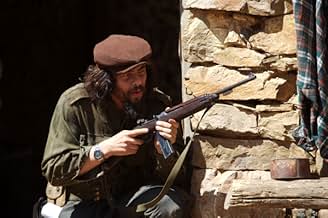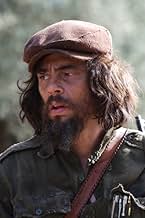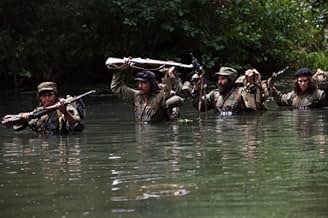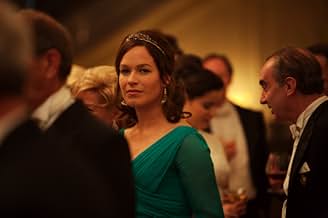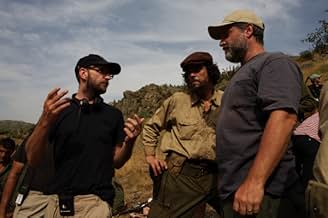Dopo la rivoluzione cubana, il Che è all'apice della sua fama e del suo potere. Poi improvvisamente sparisce, e ricompare in incognito in Bolivia, dove organizza un piccolo gruppo di compagn... Leggi tuttoDopo la rivoluzione cubana, il Che è all'apice della sua fama e del suo potere. Poi improvvisamente sparisce, e ricompare in incognito in Bolivia, dove organizza un piccolo gruppo di compagni cubani e reclute boliviane destinati a dare inizio alla grande rivoluzione latino-americ... Leggi tuttoDopo la rivoluzione cubana, il Che è all'apice della sua fama e del suo potere. Poi improvvisamente sparisce, e ricompare in incognito in Bolivia, dove organizza un piccolo gruppo di compagni cubani e reclute boliviane destinati a dare inizio alla grande rivoluzione latino-americana.
- Regia
- Sceneggiatura
- Star
- Premi
- 2 vittorie e 7 candidature totali
- Fidel Castro
- (as Demian Bichir)
Recensioni in evidenza
The pair of films, overall, are most memorable for their sequences of Guevara's guerrilla army training and battling in the jungles and waters of Cuba and Bolivia and especially for the climactic battles near the end of each film. They may each be overlong and not chart as much territory as they perhaps should. Some may wish they would delve further into the obscure intimacies of his life, especially for the benefit of those already familiar with his activism. Others may feel the film does not question his militant means often or strongly enough. No, the films are not perfect, but lesser movies than these have been well received and, as such, these two are worth a look.
Guerrilla works remarkably well as a standalone film. The story of Che's failed attempt to lead a revolution in Bolivia, then under military rule, is a compelling tragedy. The initial impetus brought by Che's arrival incognito to lead the guerrilla war is lost as misfortune follows misfortune. The odds stack up against the revolutionaries. US backing for the Bolivian army, hostile conditions in the rainforest, suspicious locals and Che's failing health are just some of the difficulties which beset the nascent rebellion.
Soderbergh's portrayal of Che is largely uncritical, but this film is no hagiography. The style is refreshingly undramatic, with a subtle and effective soundtrack by Alberto Iglesias adding quiet drama to many scenes. Che is undoubtedly the centre of the film but there are very few close-ups of his face and we are encouraged to see the people fighting alongside him and sometimes against him too. Where Soderbergh wishes to demonstrate Che's virtues we see it in small episodes such as the loyal acolyte who upbraids two fellow guerrillas when they question Che's leadership, and emphasises the sacrifice that he has made in leaving behind Cuba to fight again for revolution.
The direction throughout is superb. Part two feels tightly edited despite its narrow focus and is able to communicate a great deal through images without the need for a narrator to spell things out for the audience. At the start of the film we see a few short clips of lavish parties in post-revolutionary Cuba, immediately furnishing us with ideas as to why Che would sacrifice his old life to fight again in another country. Later on, the portrayal of guerrillas marching through the unending rainforests stands out as a strikingly beautiful scene and helps to create a feeling of the enormity of the task before this tiny band of revolutionaries.
If there is a problem with the film it is the distance between the viewer and Che, which, though it does allow us to appreciate the context of the insurgency and the people around him, makes it hard for us to understand him better as a person. True, Benicio Del Toro is utterly convincing in the lead role so much so that it is difficult to remember that you are watching an actor and not the man himself. However, watching Guerrilla as a standalone film means that we are given precious little insight into what is shaping Che's thoughts, words and actions. It is to be hoped that this is more to the fore in the first part of Soderbergh's biopic (I cannot comment on that yet), and certainly the strength of part two is making me look forward eagerly to seeing the prequel.
If you are patient enough to sit through the over four hours, with an intermission between the two sections, there are rewards. There's an authentic feel throughout--fortunately Soderbergh made the decision to film in Spanish (though some of the actors, oddly enough in the English segments especially, are wooden). You get a good outline of what guerrilla warfare, Che style, was like: the teaching, the recruitment of campesinos, the morality, the discipline, the hardship, and the fighting--as well as Che's gradual morphing from company doctor to full-fledged military leader. Use of a new 9-pound 35 mm-quality RED "digital high performance cine camera" that just became available in time for filming enabled DP Peter Andrews and his crew to produce images that are a bit cold, but at times still sing, and are always sharp and smooth.
The film is in two parts--Soderbergh is calling them two "films," and the plan is to release them commercially as such. First is 'The Argentine,' depicting Che's leadership in jungle and town fighting that led up to the fall of Havana in the late 50's, and the second is 'Guerrilla,' and concerns Che's failed effort nearly a decade later in Bolivia to spearhead a revolution, a fruitful mission that led to Guevara's capture and execution in 1967. The second part was to have been the original film and was written first and, I think, shot first. Producer Laura Bickford says that part two is more of a thriller, while part one is more of an action film with big battle scenes. Yes, but both parts have a lot in common--too much--since both spend a large part of their time following the guerrillas through rough country. Guerrilla an unmitigated downer since the Bolivian revolt was doomed from the start. The group of Cubans who tried to lead it didn't get a friendly reception from the Bolivian campesinos, who suspected foreigners, and thought of the Cuban communists as godless rapists. There is a third part, a kind of celebratory black and white interval made up of Che's speech at the United Nations in 1964 and interviews with him at that time, but that is inter-cut in the first segment. The first part also has Fidel and is considerably more upbeat, leading as it does to the victory in Santa Clara in 1959 that led to the fall of the dictatorship of Fulgencio Batista in Cuba.
During 'Guerilla' I kept thinking how this could indeed work as a quality European-style miniseries, which might begin with a shortened version of Walter Salles's 'Motorcycle Diaries' and go on to take us to Guevara's fateful meeting with Fidel in Mexico and enlistment in the 26th of July Movement. There could be much more about his extensive travels and diplomatic missions. This is far from a complete picture of the man, his childhood interest in chess, his lifelong interest in poetry, the books he wrote; even his international fame is only touched on. And what about his harsh, cruel side? Really what Soderbergh is most interested in isn't Che, but revolution, and guerrilla warfare. The lasting impression that the 4+ hours leave is of slogging through woods and jungle with wounded and sick men and women and idealistic dedication to a the cause of ending the tyranny of the rich. Someone mentioned being reminded of Terrence Malick's 'The Tin Red Line,' and yes, the meandering, episodic battle approach is similar; but 'The Thin Red Line' has stronger characters (hardly anybody emerges forcefully besides Che), and it's a really good film. This is an impressive, but unfinished and ill-fated, effort.
This 8-years-gestating, heavily researched labor of love (how many more Ocean's must come to pay for it?) is a vanity project, too long for a regular theatrical release and too short for a miniseries. Radical editing--or major expansion--would have made it into something more successful, and as it is it's a long slog, especially in the second half.
It's clear that this slogging could have been trimmed down, though it's not so clear what form the resulting film would have taken--but with a little bit of luck it might have been quite a good one.
While the movie's tone in some regards does stray off and differ quite drastically from Part One however, there still remains that same documented approach taken a month ago that avoids melodrama and fabrication as much as possible. This somewhat distant, cold approach to telling Che's story and struggle will no doubt turn some viewers off; indeed, I still remain reserved about whether or not the feature itself should have been named after one manif anything, the entirety of Che, taken as a whole, delivers a tale that goes beyond mere biography and instead documents a man's struggle alongside those who helped carry him along the way. By no means does Soderbergh try to paint a humanistic portrait here akin to what Hirschbiegel did with Der Untergang half a decade ago (excuse the ironic contrast); Che is a slow moving, reserved and meditative approach to telling a history lesson that just happens to be narrated by the one man who arguably- conducted the whole thing.
Yet by moving from the lush green landscapes of Cuba and retreating to the bleak, decaying backdrop of Bolivia for Part Two, the story does inevitably take on a distinctly contrasting tone that doesn't feel too disjointed from its predecessor, but does enough to give it its own reference points. Here, the basic structure of Part One is echoed backthere's the initial struggle, the battles, the fallen comrades and the recruiting of those to replace them, all the while we see some glimpses of the man behind the movement. Yet, as anyone with the vaguest idea of the actual history behind the feature will know, Part Two is destined to end on a much more underwhelming, and disquieting note. This difference, in combination with the similarities to Part One, make a compelling and memorable whole; by all means, both could be digested one their own (and kudos to Soderbergh for achieving as such) and enjoyed as they are, but taken as one statement, Che delivers exactly what it sets out to achieve.
Indeed, everything that made Part One the treat that it was one month prior is still evident here from the subtle yet engrossing performances from the central cast to the slow building, realistically structured combat scenesthe drama inherent to the characters on screen is just as vague and indiscernible, but with a feature such as this, Part Two once again proves that avoiding such elements don't necessarily hurt a film when there is enough plot and reflection on other elements to keep the viewer engaged. In fact, upon writing this review I was at odds as to whether or not to simply add a paragraph or two to my initial review for Part One, and title the review as a whole, yet I felt that to do so would only serve to disillusion those who may sit down to watch the entirety of both films consecutively.
With that said, I cannot rightfully decree whether or not Che holds up to the task of engaging an audience for its sprawling four hour plus runtime, but upon viewing both segments I can at least attest to each part's ability to do just that. With a reflective, intricate screenplay combined with endlessly mesmerising photography and nuanced performances that do justice to the movie's characters without drawing attention to themselves, Che Part Two is every bit as compelling and rewarding as its predecessor, but this time with a tragic but uplifting, reaffirming conclusion fit for the history pages of film.
- A review by Jamie Robert Ward (http://www.invocus.net)
Lo sapevi?
- QuizWas the first feature-length movie to be shot with the Red One Digital Camera, as well as the first mainstream film to be shot in the 4K resolution. (Part One was also shot with this camera, but Part Two was shot first so Benicio Del Toro could gradually regain the weight he lost for this film)
- BlooperAt his execution, Che was shot a total of nine times, not three as shown in the movie.
- Citazioni
Ernesto Che Guevara: To survive here, to win... you have to live as if you've already died.
- Colonne sonoreBalderrama
Lyrics by Manuel José Castilla
Music by Gustavo Leguizamon
Performed by Mercedes Sosa
Courtesy of Universal Music
Copyright (c) by Lagos Editorial (Warner/Chappell Music Argentina)
I più visti
Dettagli
Botteghino
- Budget
- 40.000.000 USD (previsto)
- Lordo Stati Uniti e Canada
- 748.555 USD
- Fine settimana di apertura Stati Uniti e Canada
- 61.070 USD
- 14 dic 2008
- Lordo in tutto il mondo
- 8.638.163 USD
- Tempo di esecuzione2 ore 15 minuti
- Colore
- Mix di suoni
- Proporzioni
- 1.85 : 1


